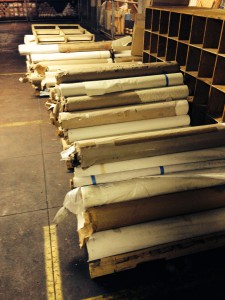Nonprofits across the country are getting advice from St. Vincent de Paul of Lane County, Oregon, on how to mine waste streams for revenue streams.
St. Vincent de Paul reportedly has trailers at transfer sites from Portland to San Jose to intercept and collect furniture, clothes, mattresses and other items headed to the landfill. The money it makes from recycling or reselling the items fund services that help over 84,000 people annually.
“They have one of the biggest and best reuse operations I have ever seen,” says Todd Sutton, who works out of Great Forest’s San Francisco office, “and I have seen many. They really understand the value of what many people see as waste.”


The thriving nonprofit has been known to sell salvaged U.S. textbooks in Asia, and oak furniture (discarded in England) in Eugene. They also run a big mattress recycling operation in Lane County.
So when a hotel in San Francisco approached Great Forest for help with several thousand pounds of old wallpaper that they had in storage for more than a decade, Todd knew what to do.
“Once I saw the amount of wallpaper they needed to dispose of, I immediately knew that one of the first calls I would make would be to St. Vincent de Paul,” remembers Todd.
“The hotel had so much old wallpaper that they were storing them in an adjacent building. There were rows and rows of wallpaper. About eight pallets worth just taking up space. They were meant to be used for replacements or repairs but when the hotel renovated, the wallpaper became obsolete.”
“Bulk wallpaper is a challenging material to dispose of in an environmentally proper manner. I had worked with St. Vincent de Paul before and I knew they had knack for finding value even in unusual items. As I anticipated, the good people at the Oakland branch of St. Vincent de Paul didn’t hesitate to accept the wallpaper.”
Finding sustainable solutions for unwanted assets is one of the challenges that all businesses face regularly. Reuse and recycling should always be explored first. Making the right connection between donors and receivers is key, and that is something we help clients do across the country.
The hotel now has freed up storage space, and it avoided high disposal costs.
With the foresight to see value in “waste,” the innovative St. Vincent de Paul has mastered a lesson that many others have yet to learn.
